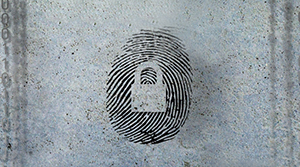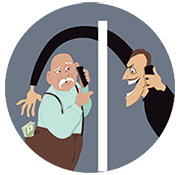EverSafe Scam Watch
Protecting Your Financial Health
Tax Season is Here: ID Theft & What to Watch For
In a winter of scams, criminals are trying lots of ways to pry cash out of honest taxpayers. They may pretend to work for the Internal Revenue Service and fraudulently obtain personal data. They may falsely claim that you owe money to the government. They may try to capture your tax return. They may be “ghost” tax preparers with fake credentials. Or they may attempt to obtain a refund – in your name, a scheme that can be identified by comprehensive fraud monitoring that includes the opening of phony depository accounts.
Older adults are often the targets of such financial fraud. And now, with tax season on the horizon, we are hearing about a new scheme that is causing headaches for unfortunate taxpayers: They are receiving tax notices  for unemployment benefits they never collected.
for unemployment benefits they never collected.
The problem is rooted in the economic downturn brought by the COVID-19 pandemic. Identity thieves filed phony claims for unemployment benefits, using stolen personal data. In many cases, crooks got the money, and potentially eligible individuals never saw a penny. Now, state labor agencies are sending out 1099-G forms telling people they owe thousands of dollars of federal taxes for unemployment benefits they never received. (Jobless benefits are counted as taxable income by the federal government; the majority of states also tax the benefits, although state rules vary.)
According to the Federal Trade Commission, fraud involving government benefits skyrocketed last year, with almost 400,000 reports – compared to just 12,900 in 2019. In California alone, criminals captured more than $11 billion in unemployment benefits – about 10 percent of the state’s total.
Tax bills for 2020 are now bringing this matter to a head. The IRS wants anyone who received a 1099-G form listing benefits they never received to inform their state labor agency and to request a corrected 1099-G. Doing so may save you from an excessive tax payment and further problems from this scam.
IRS Unveils Tool to Protect Your Savings
As a defense against benefits fraud and other tax-related schemes, the IRS is now making fully available a safeguard known as the Identity Protection Pin. The voluntary Identity Protection Pin (IP PIN) is a secret, six-digit code known only to the IRS and  the individual that has it. The IP PIN makes it much harder for scammers to file false tax returns in another person’s name.
the individual that has it. The IP PIN makes it much harder for scammers to file false tax returns in another person’s name.
“This is a way to, in essence, lock your tax account, and the IP PIN serves as the key to opening that account,” said IRS Commissioner Chuck Rettig. “Electronic returns that do not contain the correct IP PIN will be rejected, and paper returns will go through additional scrutiny for fraud.”
The IRS introduced the IP PIN program about 10 years ago, but limited participation to victims of identity theft. It has gradually been expanding the program but only opened it to the entire public in January. In order to participate, a taxpayer must complete a rigorous verification process that includes confirming various personal accounts, such as a credit cards, mortgages and auto loans.
To learn more, go to: https://www.irs.gov/identity-theft-fraud-scams/identity-verification-for-irs-letter-recipients.
Poll: Online Shoppers Need More Protection
Six in 10 Americans now believe they may be hit by an identity theft in the coming year, according to a new survey by the American Institute of Certified Public Accountants (AICPA). Nonetheless, the AICPA cautioned that consumers are not taking sufficient steps to protect themselves, given the surge in online shopping during the pandemic. Less than half of Americans have compared their credit card statements to their actual expenditures, for example, and nearly two in five Americans use the same password and username on more than one website.
“In this environment, it’s essential that Americans are defending their personal information from fraudulent threats,” said Kim Hardy, a financial expert and member of the AICPA’s National CPA Financial Literacy Commission.
…Because Identity Theft is a Threat That Lingers
It’s always important to guard against fraud and scams – and to keep track of new risks as they emerge. Official government data show that certain kinds of identity theft spiked last year, as crooks exploited new opportunities brought by COVID-19.
- Criminals greatly increased efforts to defraud small-business loan programs, using phony personal information. Such fraud jumped to 99,650 cases last year from 43,920 the year before, according to the Federal Trade Commission.
- Tax identity theft, including fraud involving federal stimulus payments, shot up more than threefold by some measures to more than 89,000 cases.
- Fraudulent claims involving unemployment and other government benefits, as mentioned earlier, have soared toward 400,000 cases.
 Consumers should stay vigilant about unusual activity on any of their accounts and avoid clicking on links from sources they do not know to be safe. Remember that many credit monitoring services only analyze suspicious activity in your credit report – and do not cover all transactions, like the opening of new accounts or the use of dormant credit cards. Specialized protection for older adults and their families, such as that offered by EverSafe, can fill this important role.
Consumers should stay vigilant about unusual activity on any of their accounts and avoid clicking on links from sources they do not know to be safe. Remember that many credit monitoring services only analyze suspicious activity in your credit report – and do not cover all transactions, like the opening of new accounts or the use of dormant credit cards. Specialized protection for older adults and their families, such as that offered by EverSafe, can fill this important role.
If you believe that you have been the victim of identity theft, the FTC recommends that you take certain steps right away. These include:
- Calling any companies where you know that fraud took place.
- Placing a fraud alert on your credit reports.
- Getting a copy of your credit report.
- Reporting the theft to the FTC.
- Reporting the theft to your local police department.
For more information, go to the official FTC identity theft web page: https://identitytheft.gov.
Keep Utility Scammers Out in the Cold
Con artists understand that a lot of people have tight budgets this year, and they have taken advantage of winter weather and continuing COVID restrictions to prey on consumers. Beware of fraudsters who claim to work for utilities and seek payments through digital apps, Bitcoin (virtual currency), or your bank account.
According to a group known as Utilities United Against Scams, hustlers are using a range of dirty tactics to trick people out of money and valuable personal data. These include:
 Phony threats to cut off service. Scammers pretend to represent your utility and demand that you provide money or personal data to avoid a cut-off.
Phony threats to cut off service. Scammers pretend to represent your utility and demand that you provide money or personal data to avoid a cut-off.
Phony promises of a refund. Scammers tell customers that they have overpaid utility bills and are due a refund. They then request customer banking information to process the refund that never will arrive.
Phony claims of a discount. The crooks may falsely say that giving them an immediate payment or charitable donation will lower your utility bill.
If you are approached by someone on a utility payment issue, the utilities coalition advises the public:
- Verify that they are a legitimate employee. If the individual has knocked on your door, ask to see company ID. You can always contact the utility yourself (find the contact info on a recent bill).
- Don’t be rushed. Pressure to pay right away or provide personal information in a hurry is a red flag.
- Ask questions. If anything about the request seems odd or unsafe, do not proceed with the conversation.
Always remember that you have rights as a consumer. When a request seems fishy, your hunch is likely correct. If you have questions about a potential scam, you can call EverSafe’s hotline at 888-728-8850 and/or forward the written communication to hotline@eversafe.com. You can often stop exploiters in their tracks–if you take steps to protect yourself and your family.



